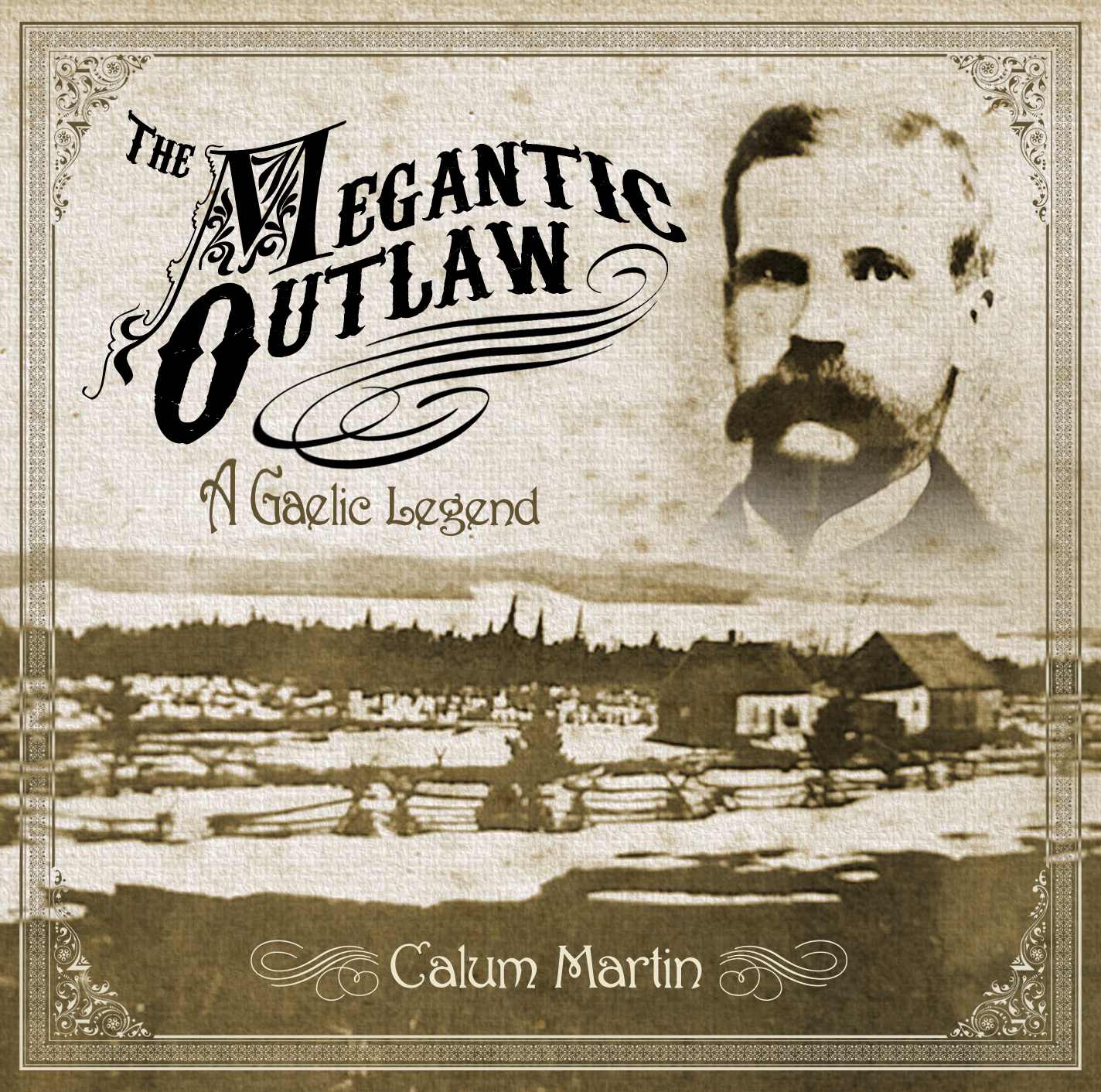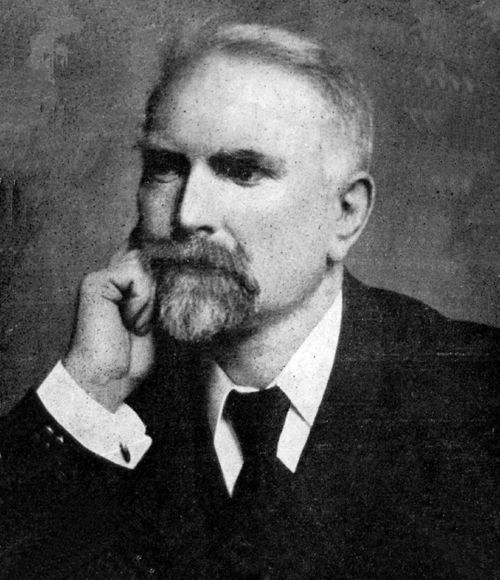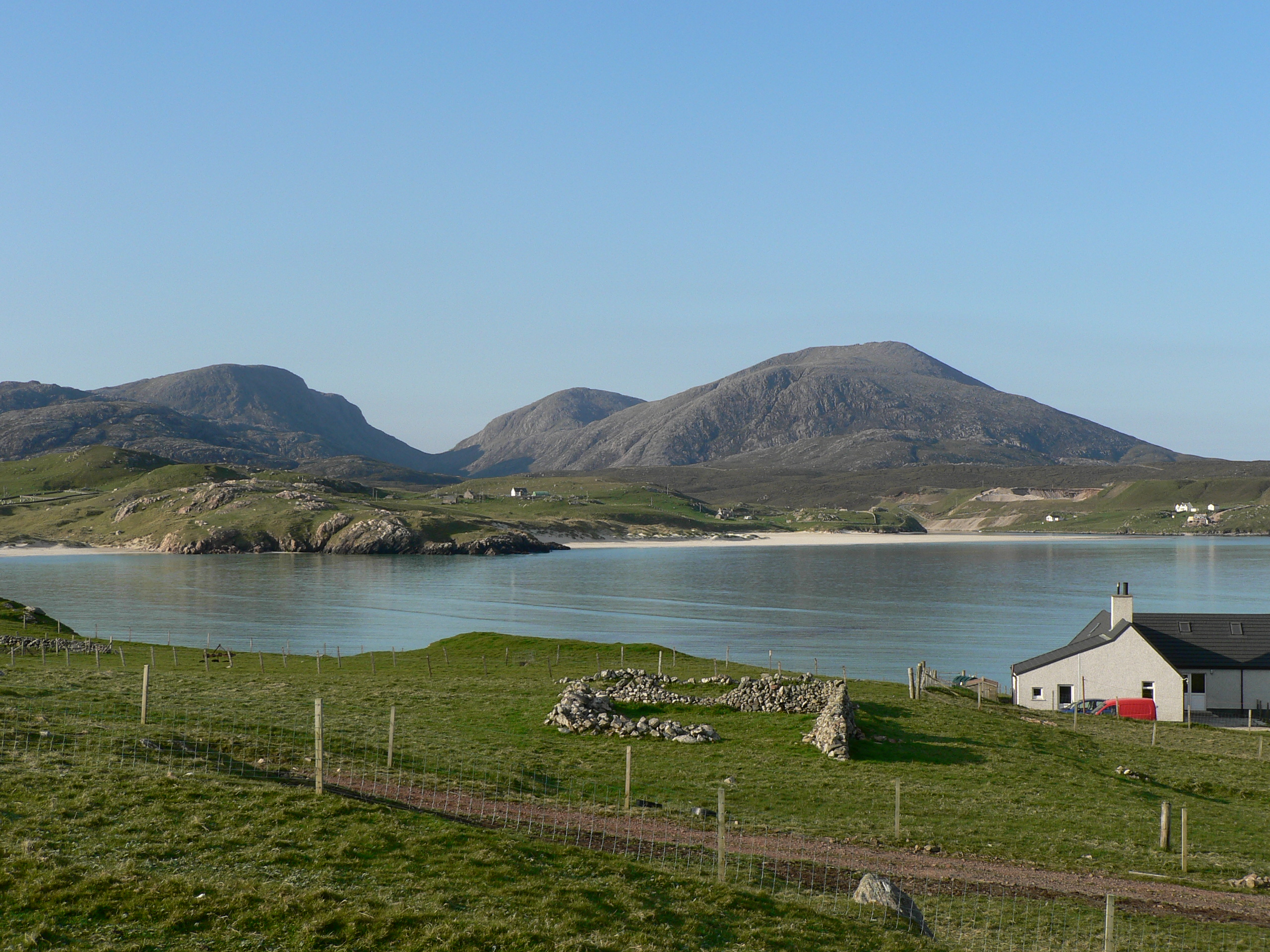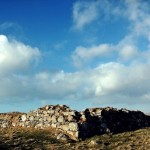Category: Emigration
A Church in Trinidad
Angus and Lottie and Jeff and Laura
Hi Ho Ro Tha Mi Duilich
The Last Man of Bereiro
The Clearance of Vuia Mhòr
Christmas at Fort Pitt, 1884
The Career of William Maclean
Farquhar Macdonald: A Contract with the Hudson’s Bay Company, 1832
The Megantic Outlaw: the Show, in Uig 14 July

O an strì ann an tìr a phailteis,
O am fallas, o am fuachd,
Cha robh cùisean mar bha dùil seo idir
Le olc is aingidheachd is cruas.
— Tìr a Phailteis, Calum Martin
The Megantic Outlaw, Donald Morrison, is a folk hero in Quebec and Uig alike and his story is well-known on both sides of the Atlantic. The ruins of his grandfather’s blackhouse can still be seen in Kneep, on the hillside behind the machair and Loch nan Cuilc, but the family left for Quebec, where they settled near Lake Megantic and where Donald was born, their youngest son.
This year, as part of the Hebridean Celtic Festival, local musician and teacher Calum Martin is bringing his Gaelic folk-rock song cycle based on the Megantic Outlaw’s life, to Uig and Stornoway. The story follows the family’s voyage from Lewis, their hardships in the new land, and Morrison’s ten months on the run until his capture, imprisonment and eventual demise.
For this show Calum has brought together an amazing cast of musicians from both sides of the Atlantic featuring Fraser Fifield (Sax/Whistles), Graeme Stephen (guitars), Bobby Millar (bass guitar); from upstate New York by way of Nashville Tennessee, Peter Young (Drummer/Producer) from Nashville, Scott Neubert (guitars/dobro/banjo/mandolin) and from Lewis Andrew Yearly (keyboard/accordion) and Calum’s own daughter Isobel Ann Martin (vocals).
Tuesday 14 July 2009 at Uig Community Centre, 8pm
Wednesday 15 July 2009 at An Lanntair, Stornoway, 7.30pm
Tickets from the Hebridean Celtic Festival box office (online, from 01851 702333, or on Saturdays 11-4 from the office in Stornoway, and a little nearer the time from us Uig Museum in the community centre) for this and all the other Festival gigs. Calum Martin also wrote and performed the new Festival anthem, Blue on Green, which is available as a free download from the Festival website (and playable here – click the arrow.)
[audio:blueongreen.mp3]And now for the Megantic Outlaw’s story, from the CD insert; the Gaelic follows the English version. Song titles are in bold and the full text in Gaelic and English, plus more audio samples, are at the Megantic Outlaw website. (It’s worth noting that the double-crosser, Lieut-Col Malcolm Macaulay, was also an Uigeach, apparently of a family cleared from Baile Nicol (now Ardroil) about 1840.)
* * *
Donald Morrison was born in the township of Megantic, Quebec in the year 1858, the youngest son of Scots immigrant parents. Years earlier Murdo and Sophie Morrison had been driven by hardship from their native Hebridean Island of Lewis and forced to set sail on The Ship of Hope for a new life in Canada. Building a new life was not so easy for the new immigrants, not only did they have to overcome a harsh environment but deceit and injustice were rife in this Land of Plenty.
Being the youngest, Donald was the last to leave the family home. Like many of his generation, he headed westward to seek his fortune, working as a cowboy, and he became used to the freedom of the wide open spaces, and from this work, sent home regular contributions to help his parents re-pay the debt on the family home.
On The Journey Home after 7 years toil, he fondly imagines that by now the debt must be about paid. To a Lewis man, like Donald’s father, Murdo, a man’s word is his bond; he had paid off the family debt with no thought of written receipt, but Macaulay, the unscrupulous money-lender, denied receiving the payments, had the Morrison’s evicted from their home, and after The Deceit sold it off to a Frenchman. After trying in vain to obtain justice through the courts, Donald is left with nothing but deep anger and bitterness.
William Dearg’s Medals
Norman Morrison’s Testimony
On 4 June 1883 the Napier Commission, chaired by Lord Napier, was in Miavaig to take evidence from crofters and others on issues surround land management and tenancy. Among those interviewed was Norman Morrison, crofter and fisherman at Brenish, aged 61, who stated he had two milk cows, three young beasts, between fifteen and twenty sheep, and no horse, on a croft which he shared with his brother, who kept similar stock. The following is slightly abridged.
Have you been fairly elected a delgate by the people of Brenish? Yes
How many people were present when you were elected? All the male population of the town.
Have you any statement to make on behalf of the people? I would say, in the first place, that they are crowded so much together that they have no way of living. Our places were crowded first when the neighbouring township of Mealista was cleared [in 1838]. Six families of that township were thrown in among us; the rest were hounded away to Australia and America, and I think I hear the cry of the children till this day. There were others came from various townships since at different times as these were being cleared, and I instance various examples – one from one place and one from another – and not one was placed in among us in that way, but accommodation was provided for him by subdividing the lots that were in the place. We were deprived of the old rights of the township moorland pasture. The half of the island of Mealista belong in the time of my grandfather to our township and a neighbouring township – we were deprived of that. We got no abatement of rent when we were deprived of that but when Cameron lotted out the township the rent was increased by £30.
As you are sixty-one years of age, can you perhaps remember how many families there were in Brenish before the township was cleared and the people taken to Brenish? Between twelve and sixteen.
How many are there now? Forty-three.
How many of those are crofters paying rent to the proprietor? There are twenty-nine names on the rent roll.
And the rest are cottars? There are some of them who pay from 5s to 10s.
Then the number of the families has increased from sixteen to forty-three. How many of that number do you think have come in from the outside and how many are the natural increase of the place? Seven came from the outside. We also consider we have a grievance with respect to the herd of the march. It is fourteen years since a herd was set apart for ourselves and the neighbouring tacksman, and we are quite willing to pay the half of the wages of that shepherd, but we have always had the idea that the neighbouring tacksman marching with us ought to pay the other half. We are also complaining about the dyke that was build about thirty-four years ago. It was built in the time of the destitution, and the people were paid for the building of it by so much Indian meal. Four shillings or five shillings additional rent was placed upone every one that was on the rent roll at that date for this dyke, and we were under the impression that when the expense of putting up the fence was paid this 4s or 5s would be taken away.
Letter from Hector Maclean in the Transvaal, 1902
Starting at Crowlista School
An extract from the unpublished memoirs of Rev Col AJ Mackenzie, son of the gamekeeper Roderick Mackenzie. AJ was born in 1887 in Kinlochresort and moved with his family to the keeper’s house at Uig Lodge, where he began at Crowlista School.
In May 1892 after the spring holidays, I began my formal education. I had never been at school before except for one day at Kinlochresort when my mother sent me with the other boys thinking I would be happier at school, than alone by myself all day at home. I soon decided that I thought otherwise and as I did not show my enthusiasm to repeat the experience next day, I was not pressed to go any more. But now by law I was compelled to go to school and there was no evading it.
I set off in high spirits with the rest of the boys, buoyed up with their accounts of the joy of life at school. Hitherto I had only looked at the school from a distance and as I drew nearer I was conscious of a conflict of feelings. I began to feel that I was about to be swallowed up in something new and strange and that things would never be quite the same again. There were over a hundred pupils in the school at that time. It was in fact hopelessly over crowded, in the following year an extension was put to it, that was another thrill for us boys to see masons, joiners and painters at work.
I had never seen so many children together before, but what filled me with amazement was the amount of noise they made with their chattering. The master, obviously, had not come in yet. When he did, the scene underwent an astonishingly rapid transformation. He picked up a thick cane and gave half a dozen hard smacks with it on the blackboard. At that instance a dead silence fell on the school. I had never seen such behaviour before and I do not in the least exaggerate when I say I was not a little scared. It took me a little time to discover that our teacher, Mr Stevenson was not as terrifying a person as he appeared to be. The first day passed off uneventfully; the second was not so happy; and the third full of doubt and forebodings. The freedom I had so long enjoyed was gone unless I could do something to recover it.
The forth day was a historic one. I set out as usual with the others but when just out of sight of home I decided on my course of action. I sat down, and calmly announced to the boys that I was not going to school that day. Curiously they did not attempt to persuade me; they may have thought that a more effective authority would soon see that. The authority was soon forthcoming in the person of my mother. She evidently had a suspicion that I had something in my mind when I set out that morning, so she came out to see from the near hill if I was on my way over the moor path to school. Her unexpected appearance startled me, but in no way lessened my determination to make a bid to free myself from the obligations of school that day and for ever.
The Departure of the Barlow, 1851
Waiting for the Barlow
Farquhar Mackay, Mangersta, in Letters
Donald Maciver and An Ataireachd Àrd
 Donald Maciver was born in Crowlista in 1857, son of John Maciver, the Gaelic schoolmaster and missionary, and they lived in Ness and then South Lochs. Donald also became a teacher, at Lemreway (see the school log), Breasclete and latterly Bayble.
Donald Maciver was born in Crowlista in 1857, son of John Maciver, the Gaelic schoolmaster and missionary, and they lived in Ness and then South Lochs. Donald also became a teacher, at Lemreway (see the school log), Breasclete and latterly Bayble.
The family had come from Carnish, just across the sands, which had been cleared in the early 1850s. Donald would spend a lot of time in Crowlista with his maiden aunts, Mary, Ann and Effie, who were very enterprising. Effie used to take a passage to Glasgow, with tweeds and eggs to trade for goods which she sold on her return to Uig.
Donald composed An Ataireach Àrd when he was visiting in Uig accompanied by his uncle Dòmhnall Bàn Crosd, who had had left Carnish in 1851 for Canada. While they were walking around Carnish, long cleared of all inhabitants, the uncle remarked, “Chan eil nìth an seo man a bha e, ach ataireachd na mara.”
On being asked later about his inspiration, Donald said, “An Ataireachd Bhuan, or the everlasting blustering of the sea on the sands of Uig. Hero, Donald Ban, an uncle on a visit from Canada. Scene, Carnish Bay, which he left in 1851. This finest pugilist in the Island of Lewis in his day shed tears this Sunday afternoon in Carnish.” The song won first prize in the 1908 Mod.
An ataireachd bhuan,
Cluinn fuaim na h-ataireachd àrd,
Tha torann a’ chuain
Mar chualas leam-s’ e nam phàist,
Gun mhùthadh gun truas
A’ sluaisreadh gainneimh na tràghad
An ataireachd bhuan,
Cluinn fuaim na h-ataireachd àrd.
Gach làd le a stuadh,
Cho luaisgeach, faramach, bàn
Na chabhaig gu cruaidh
‘S e gruamach, dosrach, gun sgàth,
Ach strìochdaidh a luaths
Aig bruaich na h-uidhe bh’ aig càch,
Mar chaochail an sluagh
Bha uair sa bhaile-sa tàmh.
The Lewis Settlement in Bruce County
The Lewis Colony in Duluth, Minnesota
A large number of Lewismen settled in Duluth, Minnesota in the 1870s and 1880s, many becoming prominent citizens in the town. The first was William L Maclennan (1834-1888), son of Donald Maclennan. This family seems to have originated in Kintail or Lochalsh; in 1841 Donald was a shepherd in Bunavoneadar, Harris, and soon thereafter became a small tenant at Kinlochresort, Uig. The family emigrated to Bruce County, Ontario in the 1850s. The following appeared in the Stornoway Gazette in the 1940s:
It is uncertain who were the first Lewismen at the Head of Lake Superior or when they came. It is a well-known fact that in the early days of the Hudson Bay Company, they preferred to recruit men for their service in the Isle of Lewis, as Lewismen were found to be very hardy and able to carry on in the severe work of trading, and it was also found that they were more capable of making friends with the Indians of Northwest America than was any other group of people. It is known that Morrison County, in the central part of Minnesota, was named for a descendant of the last Brieve of Lewis.
However, the first Lewisman who made his permanent home in Duluth was William L Maclennan, whose home in Lewis was near Loch Hamnaway. His family emigrated to Ontario in the ‘fifties. After a short period there, Mr Maclennan conceived the idea that there might be better opportunities for a young man in the United States, so he moved to Duluth in the late ‘sixties. Duluth was then only a small pioneer town on the outskirts of civilisation. He went into several lines of business in the new town, principally contracting and real estate. He was the builder of the breakwater in Lake Superior that formed what was then the outside harbour of Duluth before the canal was opened to the main harbour.
After settling in Duluth, he brought Miss Julia Macleod to this country in 1872 to be his wife. She was a daughter of Roderick Macleod, a well-known builder in Stornoway at the time. Shortly after they were married, Mr Maclennan became one of the organisers of the first bank in Duluth. After organising the bank, the promoters were looking for a capable man to manage the new bank. Mrs Maclennan suggested Mr AR Macfarlane who at that time was in a bank at Toronto, Ontario. Mr Macfarlane, a native of Stornoway, got his early training in the banks there. Mr Macfarlane accepted the new position, and under his guidance the American Exchange Bank of Duluth grew to be one of the largest in the Northwest. Mr Alexander M Morrison of Stornoway, an acquaintance of Mrs Maclennan and Mr Macfarlane, moved to Duluth in the early ‘seventies. He entered the grocery business and made a success of it.


